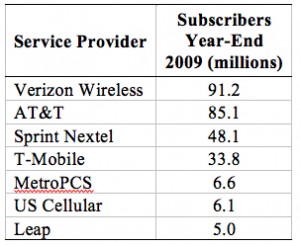Telecommunications regulations have a long history of protecting incumbents, often because incumbents are able to use the regulatory process to insulate themselves from competition. Unfortunately, we already see the seeds of that outcome in the response to a restrictive data plan offered by MetroPCS, but in this case due not to the actions of incumbents, but rather to the actions of some public interest groups.
MetroPCS, a regional mobile provider, offers a number of service plans with different voice and data combinations. Its cheapest plan is $40 per month and offers unlimited voice, messaging, and web access. The unlimited web access, however, does not allow access to certain sites like Netflix and Skype, but does allow access to YouTube. Access to the full Internet requires a more expensive plan.
Net neutrality advocates argue that the restricted plans violate at least the spirit, if not the letter, of the new regulations. The advocates may very well be correct, and that’s the problem.
MetroPCS is a small player in the mobile market, as the table from the FCC below demonstrates. It has no market power. Subscribers are not “locked in” when they sign up because they don’t have to sign contracts.

MetroPCS must believe that this combination of unlimited voice and unlimited use of a restricted set of web services will appeal to some people, and that walling off certain parts of the Internet will reduce its costs.
As an entrant in a high fixed-cost market, MetroPCS must find ways to differentiate itself from the larger carriers and reduce costs if it is to succeed. While it sounds appealing on its face to make the entire web accessible to MetroPCS subscribers, requiring MetroPCS to offer precisely the same services as larger carriers could leave it with no sustainable business model.
Allowing MetroPCS to experiment with business plans does not, however, mean that it should mislead consumers. Our perusal of its website and calls to customer service left us confused about which services, exactly, it excludes from the plan. Presumably MetroPCS uses a well-defined algorithm for deciding which sites it excludes. It should be able to explain that algorithm to potential subscribers, though any harm is limited due to the absence of contracts, meaning that consumers can switch plans or cancel if they find the restrictions too onerous.
Despite this (hopefully soon-to-be-rectified) transparency issue, this plan is a business model that one of the smallest players in the mobile industry hopes will help it to compete successfully against its much bigger rivals.
Prohibiting MetroPCS from offering its new plan would benefit the large, incumbent carriers, not consumers. Let MetroPCS experiment. It would be a shame if the Commission’s first enforcement action under the new regulation reduces wireless competition.


